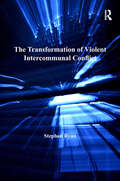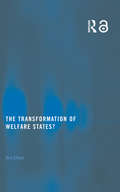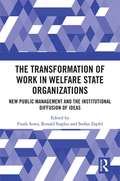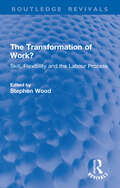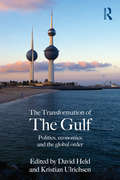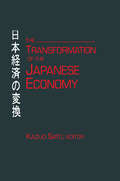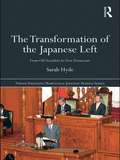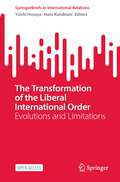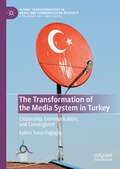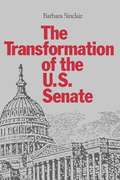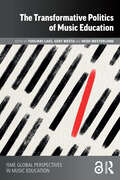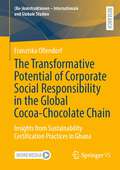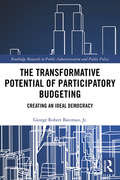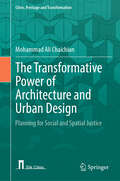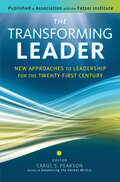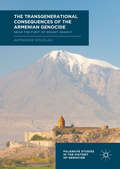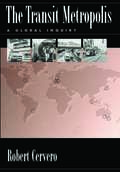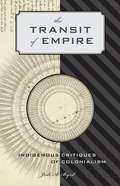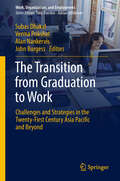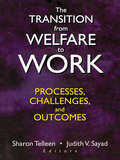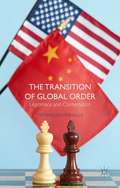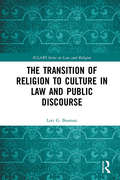- Table View
- List View
The Transformation of Violent Intercommunal Conflict
by Stephen RyanIn recent years there has been a remarkable growth of interest in the concept of conflict transformation and the closely related strategy of grass-roots peace building. Yet there exists no general critical analysis of the concept of conflict transformation in the context of violent inter-communal conflict and the different approaches that can be included in response to this category of dispute. This study offers a comprehensive survey and critical overview of this emerging area. Examining the reasons for the growing interest in the concept of conflict transformation in situations of ethnic conflict, the book explores the different dimensions of transformation. It draws on examples of strategies from a number of situations of 'ethnic conflict', including Northern Ireland, Israel/Palestine, Bosnia, Kosovo, Cyprus, Spain, Sri Lanka and the former Soviet Union , to identify and assess key issues and problems that have emerged, and ultimately to propose a stronger emphasis on the promotion of inter-subjective understanding.
The Transformation of Welfare States?
by Nick EllisonThis accessible work provides a ‘political sociology’ of welfare states in industrial societies, with both historical and contemporary perspectives. Ellison focuses on the social and political underpinnings of a number of welfare regimes and looks at the transformations they have undergone and the challenges they face. This book assesses current debates about the role of ‘globalization’ in welfare state change, paying particular attention to contemporary views about the capacity of embedded institutional structures to limit the effects of global economic pressures. Ellison assesses the changing nature of social policies in nine OECD countries – selected to include ‘liberal, ‘social democratic’ and ‘continental’ welfare regimes. Taking labour market and pension policies as the main areas of investigation, this volume provides ‘snapshots’ of welfare reform in each case, charting the ways in which different regimes ‘manage’ the range of challenges with which they are confronted. Ultimately, the book suggests that all contemporary welfare regimes are experiencing a level of ‘neoliberal drift’. As yet, this trend towards liberalization remains constrained in those countries with more ‘coordinated’ economies and institutionalized forms of social partnership – but the question is for how long? This book will be of great interest to students and scholars of International Politics, Sociology and Social Policy.
The Transformation of Work in Welfare State Organizations: New Public Management and the Institutional Diffusion of Ideas
by Ronald Staples Frank Sowa Stefan ZapfelHow has New Public Management influenced social policy reform in different developed welfare states? New managerialism is conceptualized as a paradigm, which not only shapes the decision-making process in bureaucratic organizations but also affects the practice of individuals (citizens). Public administrations have been expected to transform from traditional bureaucratic organizations into modern managerial service providers by adopting a business model that requires the efficient and effective use of resources. The introduction of managerial practices, controlling and accounting systems, management by objectives, computerization, service orientation, increased outsourcing, competitive structures and decentralized responsibility are typical of efforts to increase efficiency. These developments have been accompanied by the abolition of civil service systems and fewer secure jobs in public administrations. This book provides a sociological understanding of how public administrations deal with this transformation, how people’s role as public servants is affected, and what kind of strategies emerge either to meet these new organizational requirements or to circumvent them. It shows how hybrid arrangements of public services are created between the public and the private sphere that lead to conflicts of interest between private strategies and public tasks as well as to increasingly homogeneous social welfare provision across Europe.
The Transformation of Work?: Skill, Flexibility and the Labour Process (Routledge Revivals)
by Stephen WoodOriginally published in 1989, and now reissued with a new preface by the editor, this interdisciplinary study brings together an internationally distinguished group of scholars to shed light about work organization and the effects of new management methods and technologies. The book gives an incisive account of changes in work organization and relations during the latter part of the 20th Century. Accessible and comprehensive, it will be of interest to those in the sociology of work, industrial relations, organization theory, economics, geography and management
The Transformation of the Gulf: Politics, Economics and the Global Order
by David Held Kristian UlrichsenThis book examines the political, economic and social transformation of the six member-states of the Gulf Cooperation Council (GCC) and the ways in which these states are both shaping, and being reshaped by, the processes of globalisation. Adopting a multidisciplinary approach, the volume combines thematic chapters focusing on issues such as globalisation, nationalism and identity, political thinking, and economic diversification and redistributive policymaking with empirical chapters studying specific aspects of reform and change: the emergence of governing markets the rise of Sovereign Wealth Funds Islamic Finance the relationship between energy and sustainability trends in foreign aid donorship, strategic and foreign policy formulation. Contributions from experts in the field provide cutting-edge snapshots of a region in flux and collectively offer a roadmap of its repositioning in the global order, examining the interaction between global processes and internal dynamics of change and resistance that inject new dimensions into debates over the loci of local and global transformations and the manner in which each plays off the other. Situating the Gulf States firmly within their global twenty-first century context, this book will hold particular appeal to theorists of globalisation as well as to scholars of comparative politics, international political economy and area studies.
The Transformation of the Japanese Economy (East Gate Reader Ser.)
by Kazuo SatoDuring the rapid growth period of the Japanese economy, from the mid-1950s to the mid-1970s, the economic system that became entrenched in Japan -- the so-called Japanese-style capitalism -- was based on the government-business-bureaucracy triad. Although its distinct features survived the subsequent two decades of slow growth, there are many indications that the Japanese economy is once again struggling to transform itself. These translations from the Japanese economic literature expertly address this transformation.
The Transformation of the Japanese Left: From Old Socialists to New Democrats (Nissan Institute/Routledge Japanese Studies)
by Sarah HydeThis book examines the transition within the Japanese party system that has seen the demise of ‘the old socialists’, the Japan Socialist Party, and in its place, the emergence of the Democratic Party of Japan as the leading opposition party. Sarah Hyde has produced an original book which looks at the intra-left (non-communist) opposition party manoeuvrings during the 1990s through to the new millennium in a highly detailed and focused manner whilst simultaneously looking at the three most significant changes for the left nationally: the change to the electoral system, the change to public opinion regarding defense and the Constitution after the First Gulf War and the changes to the Labour Union movement. Ending with a chapter on the incredibly important 2007 Upper House election, which brings the development of the opposition full circle, this book will be a valuable source for students and scholars of Japanese politics, electoral systems and opposition politics.
The Transformation of the Liberal International Order: Evolutions and Limitations (SpringerBriefs in International Relations)
by Hans Kundnani Yuichi HosoyaThis open access book aims to emphasize the potential for Japan, Europe and Indo-Pacific countries including the US to respond to shared domestic and international challenges on finding joint ways to uphold and develop the liberal international order (LIO) in the Asian Pacific region and the world. It explores how these countries and the region (the EU) can work together to promote solidarity and cooperation to advance democratic standards and rules-based norms globally.The US understands the LIO in a political sense and centers its focus on democracy, aiming to build a coalition of democracies opposed to China and Russia which represent a kind of authoritarian axis. The US aims both to defend the LIO and respond to the China challenge and to build a coalition of countries that will do both. In contrast European countries aim at defending the “rules-based order”—a term preferred because they fear that the concept of the LIO might alienate or antagonize non-democratic countries. They face a dilemma between working with China to reform the LIO or, in seeking to defend it from China, excluding China. Germany and France differ regarding whether to play a passive or active role in the Indo-Pacific, the former choosing to preserve peace and stability for continued exports, and, until recently, doing little to contribute to security. Its views echo those of the ASEAN countries, which are unable or unwilling to take an active role in protecting the LIO. On the contrary France, along with the UK, actively carries out presence operations in the Indo-Pacific. Rather than upholding US dominance, France supports a multipolar order that will also reduce China’s influence in the region, with France acting as a balancing power and offering an alternative to the choice between China and the United States. Japan and India show interest in European views with the former leaning more toward its allies, the US and AUKUS, and the latter seeing Europe less as an alternative to the status quo and more as a complement of QUAD. This book concludes that the US needs to build coalitions rather than forcing allies and neighbors to choose sides, while Japan, Asian countries, and Europeans should more actively reform the LIO.
The Transformation of the Media System in Turkey: Citizenship, Communication, and Convergence (Global Transformations in Media and Communication Research - A Palgrave and IAMCR Series)
by Eylem YanardağoğluThe book focuses on the changes that the media system in Turkey went through since early 2000s. Its perspective considers sociology of citizenship and focuses on processes such as Europeanization, de-Europeanization, authoritarianism on the one hand and implications of digitalization and convergence on the other. It tracks the transformation of the media system through the trajectories of normative, participative, and entrepreneurial citizenship practices. The final sections focus on aspects of convergence evidenced in bottom-up and participatory forms of digital media such as the birth of citizen journalism and fact-checkers after the demise of conventional mainstream media in recent years.
The Transformation of the U. S. Senate
by Barbara SinclairAn excellent book on the modern Senate... Sinclair deftly combines quantitative and qualitative research approaches with insights drawn from organization and rational choice theory to provide an appealing analysis of institutional change and to speculate wisely on its broader normative significance.
The Transformation of the Workers' Party in Brazil, 1989-2009
by Wendy HunterDrawing on historical institutionalism and strategic frameworks, this book analyzes the evolution of the Workers' Party between 1989, the year of Lula's first presidential bid, and 2009, when his second presidential term entered its final stretch. The book's primary purpose is to understand why and how the once-radical Partido dos Trabalhadores (PT) moderated the programmatic positions it endorsed and adopted other aspects of a more catch-all electoral strategy, thereby increasing its electoral appeal. At the same time, the book seeks to shed light on why some of the PT's distinctive normative commitments and organizational practices have endured in the face of adaptations aimed at expanding the party's vote share. The conclusion asks whether, in the face of these changes and continuities, the PT can still be considered a mass organized party of the left.
The Transformative Politics of Music Education (ISME Series in Music Education)
by Gert Biesta Heidi Westerlund Tuulikki LaesThis book introduces a unique approach to the interconnections between music education and politics. By taking a broader, more diverse, and explicitly ethico-political philosophical and theoretical stance, the book challenges institutional and structural conditions that may be resistant to change and expands the understanding of the professional responsibility of music educators in the 21st century to meet a variety of societal and ecological challenges.Emerging from a collaboration between international music education scholars and prominent contemporary educational theorist Gert Biesta, this book connects contemporary educational theories with music education to unlock its transformational capacity. In eight chapters, the contributors show how music education can move towards ways of being and doing that are attuned to social justice and to the broader social and ecological responsibility of music professionals. Strengthening the interdisciplinary connections between music education and education, philosophy, sociology, policy, systems thinking, and more, the volume offers a renewed vision of the scope and boundaries of both music teacher education and professional work in music more widely.Connecting the decades-long work of internationally established music educator scholars and ideas from large-scale research projects with a shared interest in transformative theorisation, this book fills a knowledge gap and reframes the philosophy of music education as a vibrantly multidisciplinary, theory-generating field. Relevant to researchers and students across music teacher education and performance studies, this book speaks to both conservatoires and university contexts across Europe and North America, helping us unlock the transformative capacity of music education.
The Transformative Potential of Corporate Social Responsibility in the Global Cocoa-Chocolate Chain: Insights from Sustainability Certification Practices in Ghana ((Re-)konstruktionen - Internationale und Globale Studien)
by Franziska OllendorfThis book engages with the implications of an expanding Corporate Social Responsibility (CSR) of Transnational Corporations in their supply chains. Taking the case of a cocoa sustainability certification project in Ghana, the study examines the implementation process of such a transnational CSR intervention and its outcomes regarding the local governance and institutional environment of the cocoa sector in Ghana. The study deploys a theoretical framework based on Global Value Chain Analysis and a neo-Gramscian approach to Global Governance to assess transnational CSR as a concept and strategy that reflect power struggles in global production fields.
The Transformative Potential of Participatory Budgeting: Creating an Ideal Democracy (Routledge Research in Public Administration and Public Policy)
by George Robert Bateman, Jr.In this book, George Robert Bateman, Jr. presents a philosophical examination of the potential benefits of participatory budgeting (PB), with recommendations of how they might be realized. The work of social philosophers like Thomas Jefferson, John Dewey, Robert Putnam are studied to better understand the potential benefits and their effect on individuals and communities. Using social provisioning and John Fagg Foster’s theories of instrumental value and institutional adjustment, Bateman demonstrates how participatory budgeting in New York City (PBNYC) can realize its full potential and transform individual participants into their better selves and also transform their communities. This transformation can occur when participants are able to make decisions about things that matter in their lives. As more of us become empowered and actively engaged in deliberations concerning local economic/political issues the more we will experience public happiness, greater understanding of others, greater development of our morality, and an increased sense of belonging. The Transformative Potential of Participatory Budgeting will be of great interest to scholars in the fields of normative political theory, political philosophy, local politics, heterodox economics, institutional economics, political sociology, urban sociology, and community sociology.
The Transformative Power of Architecture and Urban Design: Planning for Social and Spatial Justice (Cities, Heritage and Transformation)
by Mohammad Ali ChaichianInformed by urban political economy and critical social analysis, this book provides a critical comparative analysis of macro- and micro-level spatial design processes in architecture and urban planning. It interrogates the extent to which past and existing approaches to design have catered to social justice issues. With a special focus on the Right to the City approach and recent efforts to democratize urban spaces in the post-COVID 19 pandemic era, the book draws on examples of spatial design from the USA, Northern European countries and elsewhere to shed light on the presence (or lack) of social justice concerns in liberal capitalist and social democratic societies. This book is an important academic addition and resource for undergraduate and graduate curricula in architecture and urban planning/design programs, as well as a complementary resource for practitioners and policy planners who engage in urban development and transformation.
The Transforming Leader: New Approaches to Leadership for the Twenty-First Century
by Carol S. PearsonNo organizational leaders can succeed in today’s fast evolving and highly connected world on their own. To succeed, today’s leaders must not only optimize all their own faculties—mental sharpness, emotional depth, imagination, and creativity—but also utilize the full capacities of those around them in a collaborative and creative manner. The prestigious contributors to this volume draw on psychology, sociology, neuroscience, social networking theory, organizational change theory, myths and traditions, and actual experiences to discover how leaders today achieve transformational results. The Transforming Leader offers an overview of what transformational leadership is, how it works, and how it is evolving. In doing so it reframes the challenge of leading in today’s interdependent, unpredictable world.
The Transgenerational Consequences of the Armenian Genocide: Near The Foot Of Mount Ararat (Palgrave Studies in the History of Genocide)
by Anthonie HolslagThis book brings together the Armenian Genocide process and its transgenerational outcome, which are often juxtaposed in existing scholarship, to ask how the Armenian Genocide is conceptualized and placed within diasporic communities. Taking a dual approach to answer this question, Anthonie Holslag studies the cultural expression of violence during the genocidal process itself, and in the aftermath for the victims. By using this approach, this book allows us to see comparatively how genocide in diasporic communities in the Netherlands, London and the US is encapsulated in an historic narrative. It paints a picture of the complexity of genocidal violence itself, but also in its transgenerational and non-spatial consequences, raising new questions of how violence can be perpetuated or interlocked with the discourse and narratives of the victims, and how the violence can be relived.
The Transit Metropolis: A Global Inquiry
by Robert CerveroAround the world, mass transit is struggling to compete with the private automobile, and in many places, its market share is rapidly eroding. Yet a number of metropolitan areas have in recent decades managed to mount cost-effective and resource-conserving transit services that provide respectable alternatives to car travel. What sets these places apart? In this book, noted transportation expert Robert Cervero provides an on-the-ground look at more than a dozen mass transit success stories, introducing the concept of the "transit metropolis"--a region where a workable fit exists between transit services and urban form. Cervero has studied cities around the world, and he makes a compelling case that metropolitan areas of any size and with any growth pattern can develop successful mass transit systems. Following an introduction that frames his argument and outlines the main issues, Cervero examines five different types of transit metropolises, with in-depth case studies of cities that represent each type. He considers the lessons of the case studies and debunks widely held myths about transit and the city. In addition, he reviews transit program efforts underway in five North American cities and discusses the factors working for and against their success. Cities profiled include Stockholm; Singapore; Tokyo; Ottawa; Zurich; Melbourne; Mexico City; Curitiba, Brazil; Portland, Oregon; and Vancouver, British Columbia. The Transit Metropolis provides practical lessons on how North American cities can manage sprawl and haphazard highway development by creating successful mass transit systems. While many books discuss the need for a sustainable transportation system, few offer examples of successful systems and provide the methods and tools needed to create such a system. This book is an invaluable resource for transportation planners and professionals, urban planners and designers, policymakers, and students of urban design and planning.
The Transit of Empire
by Jodi A. ByrdIn 1761 and again in 1768, European scientists raced around the world to observe the transit of Venus, a rare astronomical event in which the planet Venus passes in front of the sun. In The Transit of Empire, Jodi A. Byrd explores how indigeneity functions as transit, a trajectory of movement that serves as precedent within U. S. imperial history. Byrd argues that contemporary U. S. empire expands itself through a transferable "Indianness" that facilitates acquisitions of lands, territories, and resources. Examining an array of literary texts, historical moments, and pending legislations--from the Cherokee Nation of Oklahoma's vote in 2007 to expel Cherokee Freedmen to the Native Hawaiian Government Reorganization bill--Byrd demonstrates that inclusion into the multicultural cosmopole does not end colonialism as it is purported to do. Rather, that inclusion is the very site of the colonization that feeds U. S. empire. Byrd contends that the colonization of American Indian and indigenous nations is the necessary ground from which to reimagine a future where the losses of indigenous peoples are not only visible and, in turn, grieveable, but where indigenous peoples have agency to transform life on their own lands and on their own terms.
The Transit of Empire
by Jodi A. ByrdIn 1761 and again in 1768, European scientists raced around the world to observe the transit of Venus, a rare astronomical event in which the planet Venus passes in front of the sun. In The Transit of Empire, Jodi A. Byrd explores how indigeneity functions as transit, a trajectory of movement that serves as precedent within U. S. imperial history. Byrd argues that contemporary U. S. empire expands itself through a transferable "Indianness" that facilitates acquisitions of lands, territories, and resources. Examining an array of literary texts, historical moments, and pending legislations--from the Cherokee Nation of Oklahoma's vote in 2007 to expel Cherokee Freedmen to the Native Hawaiian Government Reorganization bill--Byrd demonstrates that inclusion into the multicultural cosmopole does not end colonialism as it is purported to do. Rather, that inclusion is the very site of the colonization that feeds U. S. empire. Byrd contends that the colonization of American Indian and indigenous nations is the necessary ground from which to reimagine a future where the losses of indigenous peoples are not only visible and, in turn, grieveable, but where indigenous peoples have agency to transform life on their own lands and on their own terms.
The Transit of Empire: Indigenous Critiques of Colonialism (First Peoples: New Directions in Indigenous Studies)
by Jodi A. ByrdIn 1761 and again in 1768, European scientists raced around the world to observe the transit of Venus, a rare astronomical event in which the planet Venus passes in front of the sun. In The Transit of Empire, Jodi A. Byrd explores how indigeneity functions as transit, a trajectory of movement that serves as precedent within U.S. imperial history. Byrd argues that contemporary U.S. empire expands itself through a transferable &“Indianness&” that facilitates acquisitions of lands, territories, and resources.Examining an array of literary texts, historical moments, and pending legislations—from the Cherokee Nation of Oklahoma&’s vote in 2007 to expel Cherokee Freedmen to the Native Hawaiian Government Reorganization bill—Byrd demonstrates that inclusion into the multicultural cosmopole does not end colonialism as it is purported to do. Rather, that inclusion is the very site of the colonization that feeds U.S. empire.Byrd contends that the colonization of American Indian and indigenous nations is the necessary ground from which to reimagine a future where the losses of indigenous peoples are not only visible and, in turn, grieveable, but where indigenous peoples have agency to transform life on their own lands and on their own terms.
The Transition from Graduation to Work: Challenges and Strategies in the 21st Century Asia Pacific and Beyond (Work, Organization, and Employment)
by John Burgess Subas Dhakal Verma Prikshat Alan NankervisThis book reports on the findings from a research study of vocational and higher education graduates’ employability challenges. The nature and extent of these challenges, their underlying causes, and effective strategies to address the problems in this area are all analysed from a multiple-stakeholder paradigm. The primary focus of the book is on governments; secondary, vocational, and higher education systems; and industry employers - rather than graduates themselves - in order to highlight the policy and strategy implications for governments, industry and educational systems. Readers will acquire comprehensive information on the nature and extent of graduate employability in terms of country-specific challenges, together with a deeper understanding of their complex causes, and the inter-relatedness between governments, educational systems, industry sectors, and potential employers. They will also be provided with a broad range of stakeholder strategies designed to effectively address these challenges within integrated national and regional approaches.
The Transition from Welfare to Work: Processes, Challenges, and Outcomes
by Sharon Telleen Judith V. SayadHow well do you understand the sweeping welfare reforms of the mid-1990s? The Transition from Welfare to Work: Processes, Challenges, and Outcomes provides a comprehensive examination of the welfare-to-work initiatives that were undertaken just prior to and following the major reform of United States welfare legislation in 1996. It will familiarize you with the intent of those reforms and show you how those interventions have been implemented. It also explores the barriers to employment that must be overcome by welfare-to-work clients, and the impact of these changes on clients, employers, and society. From the editors: “Although the numbers enrolled in welfare programs dropped dramatically in the last few years of the economic expansion of the 1990s, until recently we have known very little about the conditions of families affected by welfare-to-work policies. How did welfare-to-work interventions change the lives of participants and their families? What factors helped or hindered the transition to paid work? Are welfare-to-work policies likely to have actually improved the earnings or income of former AFDC recipients? This book studies all these questions.” The Transition from Welfare to Work: Processes, Challenges, and Outcomes presents qualitative, quantitative, and econometric analyses as well as panel studies, longitudinal, and quasi-experimental designs. Beginning with a brief description of the goals and structure of the Personal Responsibility and Work Opportunity Reconciliation Act of 1996, this book examines all of the phases of the welfare-to-work process. Use it to increase your understanding of: the implementation of interventions designed to place TANF recipients in jobs the factors that impact the readiness of low-income women to enter the job market the outcomes of current and earlier welfare-to-work interventions the steps we need to take to know how these citizens are faring in the welfare-to-work environment and more!
The Transition of Global Order
by Maximilian TerhalleThis study looks at the underlying foundations of global order, putting aside mainstream institutionalist approaches in showing how China and the US are engaged in an intense process of contestation and renegotiation of an institutionalized order that has long been taken for granted.
The Transition of Religion to Culture in Law and Public Discourse (ICLARS Series on Law and Religion)
by Lori G. BeamanThis book explores the recent trend toward the transformation of religious symbols and practices into culture in Western democracies. Analyses of three legal cases involving religion in the public sphere are used to illuminate this trend: a municipal council chamber; a town hall; and town board meetings. Each case involves a different national context—Canada, France and the United States—and each illustrates something interesting about the shape-shifting nature of religion, specifically its flexibility and dexterity in the face of the secular, the religious and the plural. Despite the differences in national contexts, in each instance religion is transformed into culture or heritage by the courts to justify or excuse its presence and to distance the state from the possibility that it is violating legal norms of distance from religion. The cultural practice or symbol is represented as a shared national value or activity. Transforming the ‘Other’ into ‘Us’ through reconstitution is also possible. Finally, anxiety about the ‘Other’ becomes part of the story of rendering religion as culture, resulting in the impugning of anyone who dares to question the putative shared culture. The book will be essential reading for students, academics and policy-makers working in the areas of sociology of religion, religious studies, socio-legal studies, law and public policy, constitutional law, religion and politics, and cultural studies.
